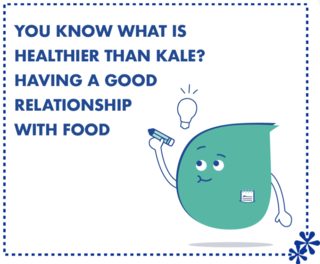Body Image
Bad Body Image Day?
It's possible that a chatbot could make a difference.
Posted January 31, 2021
Do you ever wake up to find yourself having a bad body image day?
I suspect most of you reading this know what I mean. Maybe you feel sluggish or bloated. You get dressed and your pants feel tight but you’re sure they weren’t tight the last time you wore them. You go to make yourself the breakfast you usually enjoy—yogurt, fruit, and granola—and find yourself just wanting a donut instead.
It turns out, this is all perfectly normal!
Some days, we feel better than others—both psychologically and physically, depending on how much we’ve slept, how active we’ve been, what we’ve been eating, our stress level, our mood, and maybe even the weather! It is valuable to understand that there is nothing abnormal about having a bad body image day (or days!).
And yet, a bad body image day can feel awful. Sometimes one day runs into another. Of course, although it is typical for people to feel dissatisfied with their bodies, this does not mean that this dissatisfaction is acceptable or should be a regular part of anyone’s life, especially if it impairs their ability to be their best self.
There are many ways to try to improve body image in general and feel better when a particularly bad day (or week or month—or pandemic!) strikes. However, I recently decided to investigate a new option: KIT the chatbot.
I am a middle-aged woman and KIT was designed with adolescents and young adults in mind. However, I’d read about KIT because it is the brainchild, in part, of a fellow body image researcher, Gemma Sharp. I wanted to see what KIT has to offer.
When you click on “chat with KIT” you are immediately directed to your first set of options: Are you 13+ and looking for help for yourself or are you looking for help for another person? If I had a dollar for every time someone had come to me seeking advice about body image and disordered eating for a friend, I’d be a very rich woman. So, this option seems brilliant, but I was most curious about options for those seeking help for themselves. KIT helps the user navigate a number of possibilities, including working on coping skills such as “enjoying social media” and “positive self-talk.” I loved that KIT did not demonize social media (which would surely be a total turn off for young people) and that KIT offered evidence-based information about how to develop a good relationship with food. There’s even the option for COVID-19-related concerns (e.g., coping during the pandemic in general and dealing with COVID memes are a couple of the topics).
Dr. Sharp told me that KIT was a couple of years in the making—a partnership between her research team, the Butterfly Foundation (Australia's national body image and eating disorder support organization), and Proxima (a chatbot production company). According to Sharp, her team, “wanted people to be able to receive evidence-based support in the place where they really struggle with their body image—on social media. We thought that a chatbot could be that interactive voice of positive body image on a 24/7 basis and be easily accessed.” Since KIT went live in late 2020, thousands of people have sought support from KIT. In fact, KIT’s popularity has led to planning for additional interactive tools that will be added to the support options in the near future.

KIT is the first chatbot designed to offer extensive body image and eating support online. Helplines have been available for years, including one supported by the Butterfly Foundation in Australia (1800 33 4673) and the National Eating Disorder Association in the U.S. (800 931 2237; the National Eating Disorders Association has a simple chat option as well, but it has limited capabilities). I’m not sure I’d call a helpline as a result of a bad body image day. However, KIT is so easy to use one would not need to feel any “serious” concern to try her out. Sharp also suggests that KIT, “can help someone who is thinking about seeking support transition to actually receiving that support in person. People can find speaking with a person about sensitive issues to be really challenging. A non-human anonymous and confidential service can help people become more comfortable discussing difficult issues and prepare them for seeking in-person treatment.” Anyone who feels persistent body dissatisfaction should consider some sort of professional help; a formal diagnosis is not needed to warrant help.
Researchers and clinicians who focus on body image and eating concerns have reported evidence indicating that the COVID-19 pandemic has increased these concerns. The disruption to all of our lives and routines, the isolation many have experienced, and the disturbance to adaptive coping strategies appear to be exacerbating mental health problems globally, including body dissatisfaction and eating disorders. It is likely that one of the long-term consequences of the pandemic will be the damage done to many people’s mental health. Creative and accessible options for combatting mental health problems will be needed for years to come.


